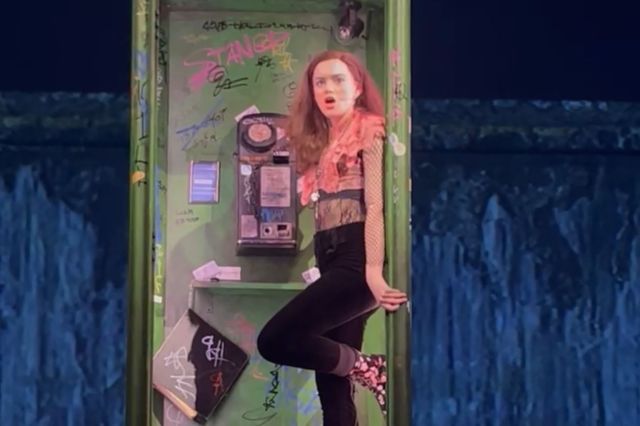Can a piece of theatre ever be a finished product?
As ”A Pacifist’s Guide to the War on Cancer” opens its international tour, Matt Trueman reflects on how shows can go through a process of reinvention

© Mark Douet
Theatre is often said to be alchemical. Sometimes, somehow, something just clicks and a show exceeds the expectations of anyone involved. It might be a matter of a play hitting its moment. It could be chemistry: the right mix of people in the right rehearsal conditions. A single, serendipitous lightning bolt of an idea can crack it.
Of course, the opposite is also true. There are also those shows that, for whatever reason, just come unstuck. They may have been misguided from the word go or they may veer off-course along the way. Mismatches happen. Life gets in the way. For better and for worse, no theatremaker ever has complete control of what they’re making. That’s art. It’s not an exact science.
This is part and parcel of what it means to take artistic risks – and it’s why we talk a lot about the right to fail. Since there’s always a chance a show might not come off, artists and producers, institutions and funders all have to accept that.
If a show doesn't work, it’s a creative team’s job to try and fix it – right?
But is it enough to leave it at that? When a show doesn’t work for whatever reason, should artists write it off, chalk it up and walk away? Or ought they stick with it and search for a solution?
This language is, of course, overly binary – shows aren’t simply successes or failures, end of; art isn’t an exam you pass or fail – but that aside, the question is still worth asking. Every artist is entitled to stick to their guns, but the right to fail doesn’t absolve anyone of responsibility. It’s not a licence to say anything goes or to shrug and quote Beckett: "Ever tried…". If a show isn’t working, it’s a creative team’s job to try and fix it – right?
That’s what previews are for – and artists will often overhaul shows completely: cutting scenes, scrapping set pieces, simplifying effects. Everyone involved works all the way up until opening night; anything to get the show into shape.
But when does that responsibility end? Spider Man: Turn off the Dark – a show that was, perhaps, too costly to fail – extended previews for seven long months, hiring new creatives and ploughing millions more into the budget, before producers cut their losses and admitted defeat. For all the ridicule they received – hubris attracts derision – you have to admire the dedication.
Few shows have that luxury and most, once open, shut up and settle in. If it hasn’t worked, so it goes – too late now. Directors generally have other jobs to go to. Budgets can’t stretch any further. Occasionally, there’s an opportunity to tweak for both hits and misses alike. Rufus Norris ordered wonder.land back into rehearsals after its premiere, but Lin-Manuel Miranda and Tommy Kail did the same with Hamilton before Broadway. The best makers are often the most committed mechanics.
Some go further still. Bryony Kimmings’ musical A Pacificist’s Guide to the War on Cancer had its admirers on opening at the National Theatre – my colleague Sarah Crompton chief among them – but most people would say, it didn’t quite come together. Ambition got the better of it, perhaps; life, as Kimmings says openly today, got in the way. "It was a great show," she told WhatsOnStage last week, "but I never felt satisfied with it."
The best thing for some shows is a bit of distance; a chance to reflect what went right
Again, you have to admire what she did next. In remounting it for a national and international tour (others might have simply put the set in the skip), Kimmings has almost entirely remade it. She might have scaled it back for a smaller touring budget, found ways of doubling up actors or nip-tucking the text, before slinging it out on the road and collecting royalties. Instead, she went back into the studio with director Kirsty Housley and rethought the show altogether.
Read Robin Brown’s review of its Liverpool opening last week and it sounds like an entirely new show. Kimmings is onstage with her sister and her friend Lara, a cancer survivor she met en route. It seems less like a musical, more like gig-theatre; a bit confessional, a bit ramshackle, very Bryony Kimmings – and, I’d guess, all the better for it.
It happens more often than you might imagine. In moving from Manchester to Shoreditch Town Hall, Nigel Barrett and Louise Mari are remaking their site-specific party-show. A new space demands an entirely new show. Ali Pidsley and Lulu Raczka have restaged A Girl in School Uniform (Walks Into A Bar) since its West Yorkshire Playhouse debut – a new, zinging design and a recast both feel more in line with the style of the script.
Theatremakers often say you only know what you’ve made once you’ve got it in front of an audience. The best thing for some shows is a bit of distance; a chance to reflect what went right, what went wrong and what might make a difference. Sticking with a show doesn’t guarantee striking gold, but it does take guts. Artists that do deserve our respect.
















